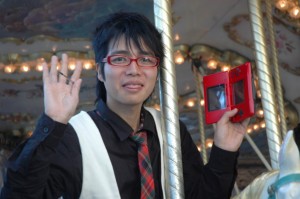With powerful hardware working together with an industry-leading camera system and intuitive AI experiences, everyday tasks have never been easier and faster
Objectophilia and animism: Falling in love with a gadget

 Gadget lust. I’ve had it. I have it a lot actually, and if you’re reading this then chances are so have you. I’ve heard you emphatically proclaim your love for your iPhone; yes, loud enough to make the Android geek three cubicles down solemnly roll his eyes. Gadget man Joshua Topolsky called the Lenovo IdeaPad U260 “Pure sex”, and even the traditionally staid Walt Mossberg, from Wall Street Journal fame, lauded the Vaio P, calling it “sexy” way back in 2009.
Gadget lust. I’ve had it. I have it a lot actually, and if you’re reading this then chances are so have you. I’ve heard you emphatically proclaim your love for your iPhone; yes, loud enough to make the Android geek three cubicles down solemnly roll his eyes. Gadget man Joshua Topolsky called the Lenovo IdeaPad U260 “Pure sex”, and even the traditionally staid Walt Mossberg, from Wall Street Journal fame, lauded the Vaio P, calling it “sexy” way back in 2009.
The thing is though, all of this lauding and swooning is decidedly platonic; effigies made of sand that erode in the wind. We give kudos, crave intensely, and anoint a gadget as the best of the best, a must have, but soon — for the most of us — it’s on to the next sweet thing.
For some however, the love affair with a particular inanimate object lingers. If you ever hear me acrimoniously shouting at my computer, it’s because I’m frustrated with some bizarre operating system slow down, or random application behaviour, but if your name is Hermione Way, you might actually be having an honest to goodness lovers’ spat.
Let me explain.
 Hermione Way is a 25 year old British blogger from Techfluff.tv who famously, unofficially married her MacBook Pro, “Alex” last year. Clearly tongue in cheek, with metaphors abound such as “we go on intellectual journeys together, he just feeds me and we end up not sleeping all night”, she has a flair for viral marketing and a good sense of humour, and as whimsical as it sounds, it got me wondering if there might be other, perhaps, more serious cases out there…
Hermione Way is a 25 year old British blogger from Techfluff.tv who famously, unofficially married her MacBook Pro, “Alex” last year. Clearly tongue in cheek, with metaphors abound such as “we go on intellectual journeys together, he just feeds me and we end up not sleeping all night”, she has a flair for viral marketing and a good sense of humour, and as whimsical as it sounds, it got me wondering if there might be other, perhaps, more serious cases out there…
My curiosity lead me to the concepts of object sexuality — also referred to as objectophilia — and animism. Purely quoting the Wikipedia article they are defined as:
“a pronounced emotional and often romantic desire towards developing significant relationships with particular inanimate objects. Those individuals with this expressed preference may feel strong feelings of attraction, love, and commitment to certain items or structures of their fixation. For some, sexual or even close emotional relationships with humans are incomprehensible. Object-sexual individuals also often believe in animism, and sense reciprocation based on the belief that objects have souls, intelligence, feelings, and are able to communicate. Contrary to sexual fetishism, the object to an OS person is viewed as their partner and not as a means to an end to enhance a human sexual relationship.”
If we’re completely honest, as far fetched as these concepts might sound, this is the Internet, and it wasn’t long until my eye caught a link to OS Internationale, an educational website and international online community for those identifying or researching the condition to love objects. It would appear then, that there is indeed a legitimate passel of people out there involved in relationships with inanimate objects.
There’s Erika La Tour Eiffel a former U.S. Air Force soldier who claims to be married to the Eiffel Tower, Eija-Riitta Eklöf Berliner-Mauer who was married to the Berlin Wall for ten years until it was taken down, at which point a nearby garden fence caught her fancy, and Amy Wolfe an Asperger syndrome sufferer from Pennsylvania who married an 80 foot gondola ride called 1001 Nachts.
This being a tech blog and all, I decided to venture deeper into this fascinating world, and eventually uncovered some remarkable people who entered into (un)holy matrimony with their gadgets.
 Couple #1: Sal9000 and Nene Anegasaki
Couple #1: Sal9000 and Nene Anegasaki
A man from Tokyo nicknamed Sal9000 tied the knot with his Nintendo DS Love Plus video game character Nene Anegasaki during a live webcast at the Tokyo Institute of Technology in 2009. Betrothed in front of a live audience, an MC, the bride’s virtual video game girlfriend — who made a speech — and a real human priest, Sal9000 praised his digital bride by saying: “She doesn’t get angry if I’m late in replying to her. Well, she gets angry, but she forgives me quickly.”
 Couple #2 Bill Rifka and Apple iBook G4
Couple #2 Bill Rifka and Apple iBook G4
Psychology student Bill Rifka admitted to having courted many a laptop before finally going steady with his iBook saying “I often flirted with many a sweet laptop on eBay and felt true desire.” Rifka eventually fell head over heels in love with his iBook and pointed out: “To me, my Mac is male. I’m living in a homosexual relationship, so to speak.” I wonder if Bill has managed to keep the flame alive over the years, or has he been seduced by a MacBook Air?
 Couple #3 “Emma” and her hi-fi system, Jake
Couple #3 “Emma” and her hi-fi system, Jake
Emma (not her real name) from the UK is romantically involved with a hi-fi system she calls Jake. Emma sees Jake as “solid, reliable and beautiful”. Apparently, she repairs him when he goes wrong, and “makes love” to him on average twice a day saying: “this is the way I communicate with him.” Like many OS people, Emma suffers from Asperger syndrome — the condition which makes it difficult for sufferers to form relationships with other people.
 Couple #4 Mary Fernandez-3GS and her iPhone 3GS
Couple #4 Mary Fernandez-3GS and her iPhone 3GS
Mary from Houston, Texas gushed, “The iPhone outperforms almost every man I’ve ever dated, I’m so happy I said iDo.” Mary married her iPhone thanks to MarryYouriPhone.com, a free public service that allows people to enter into marriage with their Apple devices. If you’re serious about getting hitched with your iDevice head on over to the site, and while you’re there don’t forget to sign the petition to “make it legal for ALL entities to have the right to marriage, whether they be carbon-based or metallic in nature”.
Why do they do it
The more I read up on the topic, the less crazy it all became. According to David Morgan, a senior psychoanalyst at the Portman NHS Trust for sexual dysfunctions, OS possibly stems from having been treated in early childhood like an inanimate, unfeeling object, which causes a person to seek refuge in a world where objects are idealised.
Erika La Tour Eiffel has been diagnosed with a chronic post-traumatic stress disorder due to abandonment and sexual abuse she suffered while growing up. Erika doesn’t see her relationship as strange and defiantly quips: “I do not wish to be fixed, if it is true that all that has happened to me in my childhood made me the person I am today, I am fine with it. I do not want to change.”
Certified sexologist Amy Marsh who surveyed a community of people with OS agrees with La Tour Eiffel’s view and says: “What I’m finding is not much history of sexual abuse, and actually not much in the way of psychiatric diagnoses either. I’m finding they’re very happy, and they don’t want to change. I am also finding out that quite a few of them have a diagnosis of Asperger’s syndrome or autism, but not everybody.”
Contrastingly, “Emma”, who suffers from Asperger syndrome, wishes for a normal relationship and said: “I would like to meet more people and to have friends, but I just think it is too difficult now. I am scared they will reject me.”
Finally, a retired professor and former director of Frankfurt University’s Institute for Sexual Science, Volkmar Sigusch, hypothesises that OS relates to society’s inclination to increasingly drift towards asexuality. He groups this inclination to be romantically involved with objects into a form of “neo-sexuality” and says that “more and more people either openly declare or can be seen to live without any intimate or trusting relationship with another person. Cities are populated by an entire army of socially isolated individuals.”
Whatever your views are, I can’t help but mildly identify with these individuals. Do you remember the last time you’ve fallen victim to the scourging remarks of a scurrilous low-life? Me too. When’s the last time your wide-eyed LCD wasn’t happy to see you?

